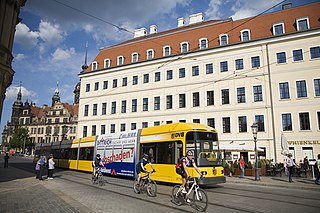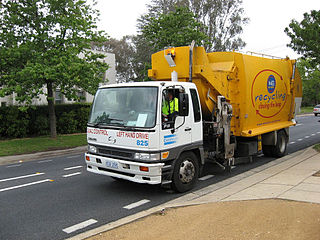
Extended producer responsibility (EPR) is a strategy to add all of the estimated environmental costs associated with a product throughout the product life cycle to the market price of that product, contemporarily mainly applied in the field of waste management. Such societal costs are typically externalities to market mechanisms, with a common example being the impact of cars.

Clean Up Australia Limited is a not-for-profit Australian environmental conservation organisation. It is registered with the Australian Charities and Not-for-profits Commission.
Planet Ark Environmental Foundation is an Australian non-profit environmental organization founded in 1992. Planet Ark aims to partner with organizations in the public and private sectors to help find ways to reduce impact on planet Earth. The focus areas are the environmental impacts of human consumption in the home, the workplace, and the community. Planet Ark's campaigns include 'Cartridges 4 Planet Ark', Australia's 'National Recycling Week', and the country's biggest annual community tree planting event, National Tree Day. The organization operates from its office in Sydney.

Zero waste, or waste minimization, is a set of principles focused on waste prevention that encourages redesigning Natural resource resource life cycles so that all products are repurposed and/or reused. The goal of the movement is to avoid sending trash to landfills, incinerators, oceans, or any other part of the environment. Currently 9% of global Plastic recycling plastic is recycled. In a zero waste system, all materials are reused until the optimum level of consumption is reached.

The Singapore Green Plan (SGP) was created in 1992 to ensure that the economic growth model of Singapore does not compromise the environment. The SGP sets out the strategies, programs and targets for Singapore to maintain a quality living environment while pursuing economic prosperity. The focus areas in the SGP are led by a main coordinating committee and respective action program committees. Since 1992, the SGP has been continuously updated to ensure its relevance, releasing SGP 2012 in 2002 and SGP 2030 in 2021. The United Nations (UN) Sustainable Development Goals (SDG) are correlated or mapped to the SGP.

A sustainable city, eco-city, or green city is a city designed with consideration for the social, economic, and environmental impact, as well as a resilient habitat for existing populations. This is done in a way that does not compromise the ability of future generations to experience the same. The UN Sustainable Development Goal 11 defines sustainable cities as those that are dedicated to achieving green sustainability, social sustainability and economic sustainability. In accordance with the UN Sustainable Development Goal 11, a sustainable city is defined as one that is dedicated to achieving green, social, and economic sustainability. They are committed to this objective by facilitating opportunities for all through a design that prioritizes inclusivity as well as maintaining a sustainable economic growth. Furthermore, the objective is to minimize the inputs of energy, water, and food, and to drastically reduce waste, as well as the outputs of heat, air pollution. Richard Register, a visual artist, first coined the term ecocity in his 1987 book Ecocity Berkeley: Building Cities for a Healthy Future, where he offers innovative city planning solutions that would work anywhere. Other leading figures who envisioned sustainable cities are architect Paul F Downton, who later founded the company Ecopolis Pty Ltd, as well as authors Timothy Beatley and Steffen Lehmann, who have written extensively on the subject. The field of industrial ecology is sometimes used in planning these cities.
There is no national law in the United States that mandates recycling. State and local governments often introduce their own recycling requirements. In 2014, the recycling/composting rate for municipal solid waste in the U.S. was 34.6%. A number of U.S. states, including California, Connecticut, Delaware, Hawaii, Iowa, Maine, Massachusetts, Michigan, New York, Oregon, and Vermont have passed laws that establish deposits or refund values on beverage containers while other jurisdictions rely on recycling goals or landfill bans of recyclable materials.

In 2015, 43.5% of the United Kingdom's municipal waste was recycled, composted or broken down by anaerobic digestion. The majority of recycling undertaken in the United Kingdom is done by statutory authorities, although commercial and industrial waste is chiefly processed by private companies. Local Authorities are responsible for the collection of municipal waste and operate contracts which are usually kerbside collection schemes. The Household Waste Recycling Act 2003 required local authorities in England to provide every household with a separate collection of at least two types of recyclable materials by 2010. Recycling policy is devolved to the administrations of Scotland, Northern Ireland and Wales who set their own targets, but all statistics are reported to Eurostat.

Litter in Australia is prevalent in many areas and a significant environmental problem, particularly in the large cities of Sydney and Melbourne. In 2023, plastics make up 81 per cent of all surveyed litter.

Electronic waste is a significant part of today's global, post-consumer waste stream. Efforts are being made to recycle and reduce this waste.
The Canberra Environment Centre (CEC) is the oldest environmental organisation in the Australian Capital Territory (ACT). It formed in 1974 as an umbrella group to represent and provide services for other environment or environment-related groups. In 2005 it changed its trading name to Canberra Environment Centre to better reflect the direction of the environment movement and the work it was undertaking in the community. Member groups of the Centre over the years have included the Canberra Organic Growers Society, Canberra Ornithologists Group, Friends of Grasslands, Nature and Society Forum, Zero Waste Australia, South East Forest Alliance, Canberra Bushwalkers, National Park Association of the ACT and Pedal Power. The Centre also has an affiliation with the Conservation Council of the ACT (ConsACT).
Green Campus Initiative (GCI), is a student organisation within the University of Cape Town. It aims to make UCT a sustainable and environmentally friendly institution. It was started towards the end of 2007 by Susan Botha, who had been working for the Namaqualand Restoration Initiative (NRI) at UCT. The initiative has its origins in the Botany Department, where Susan's work was based, but the organisation quickly grew to a campus-wide initiative. Susan is responsible for the formalisation of the GCI, including the naming of the organisation, the formation of a group on Vula, the articulation of a specific aim for the organisation, as well as the founding and co-execution of many of the first projects. These first projects included the implementation of campus-wide recycling; the organisation of UCT's first Green Week; the Building-to-Building Roadshow initiative and the promotion and implementation of carpooling. Each year a new GCI committee is elected, which includes portfolios that run the different projects. As of September 2010, the GCI has over 1500 members on Vula, of which approximately 100 are actively participating in projects.
A sustainability organization is (1) an organized group of people that aims to advance sustainability and/or (2) those actions of organizing something sustainably. Unlike many business organizations, sustainability organizations are not limited to implementing sustainability strategies which provide them with economic and cultural benefits attained through environmental responsibility. For sustainability organizations, sustainability can also be an end in itself without further justifications.

Wong Kam-sing, GBS, JP, is a Hong Kong architect and the former Secretary for the Environment, Wong had held a number of public service positions before joining the Government, including the first Chairman of the Environment and Sustainable Development Committee of the Hong Kong Institute of Architects, the Chairman of the Professional Green Building Council and the Vice Chairman of the Hong Kong Green Building Council. He has contributed to the promotion and research of the standards and guidelines for sustainable built environment applicable to the high-density urban environment of Hong Kong.

Recycling in Australia is a widespread, and comprehensive part of waste management in Australia, with 60% of all waste collected being recycled. Recycling is collected from households, commercial businesses, industries and construction. Despite its prominence, household recycling makes up only a small part (13%) of Australia's total recycling. It generally occurs through kerbside recycling collections such as the commingled recycling bin and food/garden organics recycling bin, drop-off and take-back programs, and various other schemes. Collection and management of household recycling typically falls to local councils, with private contractors collecting commercial, industrial and construction recycling. In addition to local council regulations, legislation and overarching policies are implemented and managed by the state and federal governments.
China's waste import ban, instated at the end of 2017, prevented foreign inflows of waste products. Starting in early 2018, the government of China, under Operation National Sword, banned the import of several types of waste, including plastics with a contamination level of above 0.05 percent. The ban has greatly affected recycling industries worldwide, as China had been the world's largest importer of waste plastics and processed hard-to-recycle plastics for other countries, especially in the West.

Data from the Solid Waste Management and Public Cleansing Corporation (SWCorp) collected from January to November throughout 2018 puts the national recycling rate at 0.06%, or about 1,800 tonnes of the 3 million tonnes of waste collected in the period. Majority of the waste were sent to landfills.

Waste management in Australia started to be implemented as a modern system by the second half of the 19th century, with its progresses driven by technological and sanitary advances. It is currently regulated at both federal and state level. The Commonwealth's Department of the Environment and Energy is responsible for the national legislative framework.

Environment and Ecology Bureau is a policy bureau of the Government of Hong Kong. The agency was established on 1 July 2022. The current Secretary for Environment and Ecology is Tse Chin-wan.












